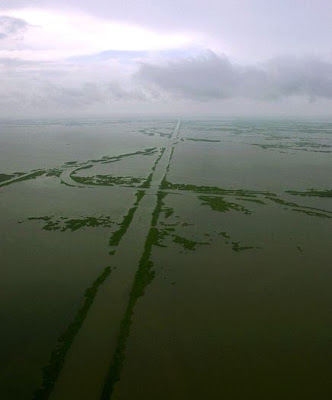 Straight lines of vegetation trace the path of a pipeline beneath the Gulf of Mexico (file photo).
Straight lines of vegetation trace the path of a pipeline beneath the Gulf of Mexico (file photo).The oil from the oil spill has now affected the marshes, and has damaged the pipelines beneath the surface. This disaster has been caused by the gulf oil spill. The oil is now affecting organisms living in these marshes as well as hurting the infrastructure of the oil industry. If this oil kills off all the plants in the marsh it will become open water witch can hurt the organisms and the oil industry, by making the coastal infrastructure susceptible to ships strikes, storms, and corrosive salt water. The Energy loss and marsh land loss are making this oil spill an even bigger problem than it already was. Natural gas pipelines and onshore oil travel around 26,420 miles through coastal countries. These pipelines were built in this vulnerable spot long ago because many people assumed that they would not be in open water, because they thought that these marsh environments were more stable than they really are.
Opinion: I was shocked when I read this article. I thought that I knew all of the outcomes of the BP oil spill. This problem that has also occurred because of the oil spill can cost oil companies a fortune on top of what they already have to pay to fix the problem of the oil leak. So many organisms from so many different species died from the oil leak. Now may more are dieing from the loss of marshes. I hope that we can fix this problem. Unfortunately I can think of much we can do to fix it. However I do think we should take this occurence into consideration if they build another oil pipeline, and dont build them in or near a marsh, swamp, or any other wetland.
Questions:
1. Can you think of anything that we can do to fix this problem in the coastal marshes? What are they?
2. What other effects has the oil spill had that most people do not know about?
3. What other things do you think will hapen because of the loss of marshes besides the loss of organisms and money?



 Summery: The U.S. Government for over three decades to help the Bald and Golden eagle revover from habitat destruction, hunting, and food contamination, DDT. The government was going to take these eagles off the threatened list, because their population is back up and still growing. However, their habitat was protected if they were considered threatened. If they were taken off the list, develpers would move back into thier habitat and make the eagles leave. This would cause a reduction in their numbers, and they could fall back into the threatened list. Many of them live near rivers. If their protection was gone, the eagles would be under a huge threat. The Government is going to put an act in place that will prohibit people from pursuit, shooting, shooting at, poisoning, wounding, killing, capturing, trapping, collecting, molesting and disturbing the eagles. The most common of these to occur in the past was shooting and hunting. Even with this act, Bald and Golden eagle's population could reduce, and they could fall back into the threatened category.
Summery: The U.S. Government for over three decades to help the Bald and Golden eagle revover from habitat destruction, hunting, and food contamination, DDT. The government was going to take these eagles off the threatened list, because their population is back up and still growing. However, their habitat was protected if they were considered threatened. If they were taken off the list, develpers would move back into thier habitat and make the eagles leave. This would cause a reduction in their numbers, and they could fall back into the threatened list. Many of them live near rivers. If their protection was gone, the eagles would be under a huge threat. The Government is going to put an act in place that will prohibit people from pursuit, shooting, shooting at, poisoning, wounding, killing, capturing, trapping, collecting, molesting and disturbing the eagles. The most common of these to occur in the past was shooting and hunting. Even with this act, Bald and Golden eagle's population could reduce, and they could fall back into the threatened category.
